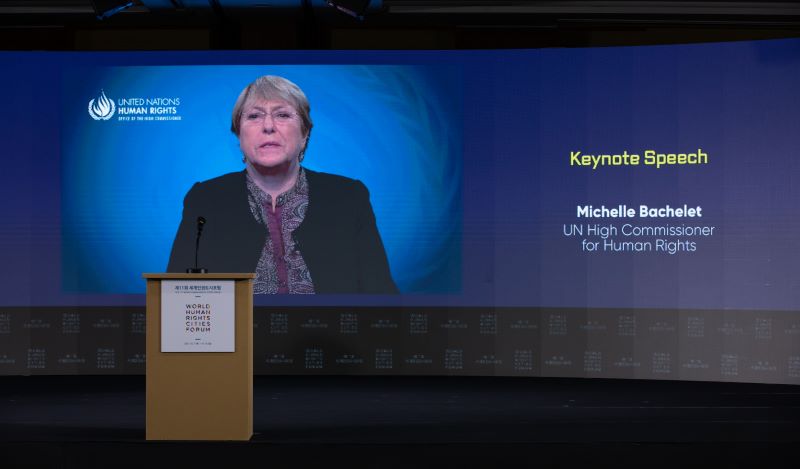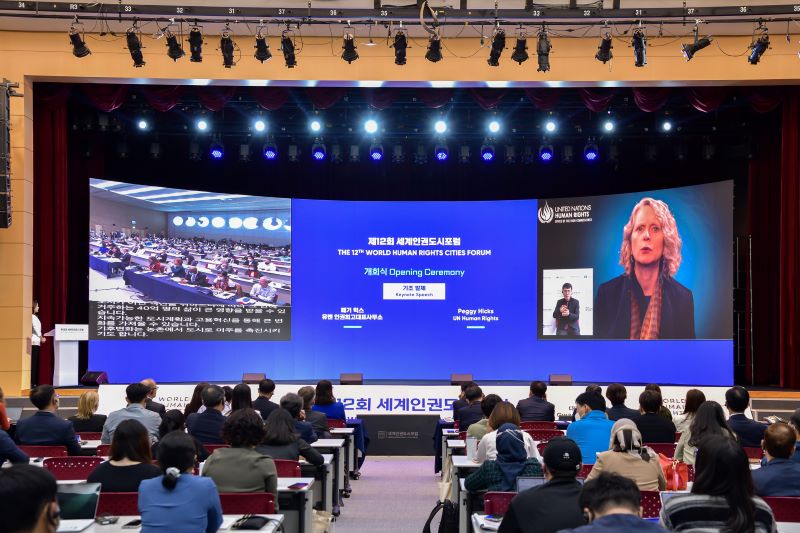The “World” and “Human Rights”: The WHRCF
By Jonathan Joseph Chiarella
Gwangju will host its 13th World Human Rights Cities Forum from October 4 to 7 at the Kim Daejung Convention Center. This year focuses on the poverty and inequalities that make realizing human rights impossible. To highlight the crisis: 600 million people will live in extreme poverty by 2030. The recent pandemic shows how inequalities in damage and recovery go far beyond one person having a nicer television than his neighbor. Jobs, lives, vaccine distribution, and even the economic and social fabric of entire communities are on the line.
The WHRCF has been bringing together speakers and attendees from various parts of the world to discuss its themes every year since the fall of 2011. Leaders and experts gather to discuss, debate, and share the actions that cities and local NGOs have taken to make life fairer for all of their residents.
Past speakers have shared success stories with town planning and outreach programs to make their cities more accessible and safer for everyone. The case of Utrecht (Netherlands) can provide a good example to follow. Another speaker may talk of her country’s shortcomings and where work needs to be done, such as the disconnect between the law and its implementation. (The ability of victims to go after their attackers correlates with wealth, which is intuitive but not always obvious for those fortunate enough to not have to deal with such scenarios. )

All participating mayors, representatives, and officials agree to a charter on what a human rights city will be and, by sharing their experiences formally (and in informal face-to-face contexts, too, of course), will thereby try to realize the goal of solidarity. The 2018 program in particular, with its concern on diversity and inclusiveness, made this dream less cynical. Speakers called out double standards regarding how society chooses which forms of “international-ness” to highlight. The national dimensions of activists’ struggles are unavoidable, but the local government focus of the conference ensures that the representativeness is not limited to the wealthiest and most prominent within given regions.
The human rights-focused May 18th organizations got the ball rolling. The GIC, however, took up organizing responsibilities in 2014, which was not the obvious move, but GIC Director Shin Gyonggu dismissed concerns of mission creep and actively rejected compartmentalization. The WHRCF has grown ever larger and has achieved official and true international status. In the inaugural year, a representative for the UN High Commissioner for Human Rights relayed special remarks. Later, however, UN notables gave keynote speeches themselves, and since 2020, the OHCHR and UNESCO started co-hosting the event. The UN Secretary General himself opened the forum in 2021. This year’s keynote speaker will be another UN heavyweight, Olivier De Schutter, who is the UN Special Rapporteur on Extreme Poverty and Human Rights. This is especially relevant for 2023’s theme.
The event’s continuing success should be an antidote to the compulsive trend of adding “world” and “international” to events. The international component is both substantial and always thematically relevant. Co-organizing has been a committee that is part of the Spain-based United Cities and Local Governments. In 2016, the Raoul Wallenberg Institute in Sweden joined in.

The relevance of the other component of the forum – “human rights” – to both poverty and to Gwangju may not be apparent at first glance. Remember that the May 18th Uprising was not encompassed both “negative” and “positive” rights. The movement was not simplyagainst martial law and the arbitrary violence of Chun’s coup government. It was alsofor democracy. Demonstrators demanded access to the ballot. This would make them citizens and not passive subjects, and having a say in your community’s destiny sounds like a human right.
That momentous week in May also showed solidarity and mutual help, particularly in transport, food, and medical care. All of this took place in a region that was markedly poorer and neglected in comparison to the home region of dictators like Park Chung Hee and Chun Doo Hwan, who were from Gyeongsangbuk-do. When one considers how being poor in a free market society can rob people of power, then Gwangju, human rights, and this year’s theme all connect.
The event provides a venue for activists, politicians, NGOs, politicians, and intellectuals to all meet and discuss the on-the-ground struggles, the research that syntheses these struggles, and the difficult academic questions of what rights are, who is entitled to them, and how we go about defining and defending them. Human rights are a guiding goal, not a signpost we can arrive at and declare mission accomplished. In this ongoing struggle, the WHCRF is a valuable venue for forging links and sharing ideas among the leaders of tomorrow and of today.
The Author
Jonathan J. Chiarella grew up in New York. He holds a B.A. in History (Rochester) as well as two M.A.s (Chonnam, Florida), and a Ph.D. in Politics (Florida). You can spot him riding the river trails or read his analysis of current affairs related to Honam or international relations.





